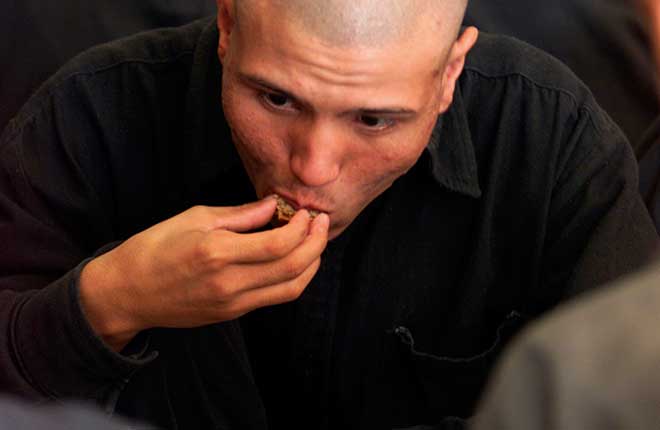A tradition in many US prisons, the last meal of the condemned to death is dying out.
Cheeseburgers, chips, steak, lobster, ice cream and Coca-Cola: these are the main items inmates on death row in America request for their last meal. The origins of this macabre tradition are unknown, though some experts believe they may hark back to the coena libera (“free dinner”) given to Roman gladiators the evening before their games.
There are traces of the practice in Europe’s past. In Frankfurt in 1772, Susanna Margarethe Brandt, condemned to death for infanticide, prepared for her execution by sitting down to a feast with six local officials and judges. Had she committed the crime in Bavaria, Brandt likely would have preceded the meal with a drink with the man who would later decapitate her, writes Brent Cunningham in the history journal Lapham’s Quarterly. It was a way for judges to obtain a prisoner’s symbolic pardon – and thus avoid being haunted by their ghost after the execution.
While the tradition of the last meal still survives in Japan, it’s in the United States that it receives the greatest attention. A special meal is by no means a given in all the 32 US states where the death penalty is enforced. Prisons publish inmates’ requests, but little is known about what is actually served.
In Florida and Oklahoma, the last meal can only be prepared using local products within a limited budget (respectively $40/€32 and $15/€12). Until 2011, the rules in Texas – where one-third of all executions in the US since 1976 have taken place – said the meal must be prepared with ingredients readily available in the kitchen. Brian Price, the prison inmate turned prison chef who prepared 189 last meals (upon his release he published the book Meals to Die For), revealed he served cod instead of the requested lobster and a hamburger with gravy rather than filet mignon.
According to a Cornell University study on the requests made by 247 people executed between 2002 and 2006, most asked for rich, calorie-filled meals, predominantly comfort food. But there have been some original requests. In 1998, converted Catholic Jonathan Nobles asked for Holy Communion; in 2000, Odell Barnes, who always proclaimed his innocence, asked for “justice, equality and world peace;” and in 2007, Philip Ray Workman asked that a vegetarian pizza be donated to a homeless person, a request the state refused to honour.
Barry Lee Fairchild, executed in 1995, criticised the absurdity of the ritual: “It’s just like putting gas in a car that don’t have no motor.” It gives back freedom of choice to people denied this freedom for many years while forcing them to participate in the ritual of their own execution. As Cunningham writes in Lapham’s Quarterly, the practice “allows the state to distinguish the violence of its punishment from the violence it is punishing,” showing the system to be more ‘humane’ than the criminal was with their victim.
When Texas abolished the last meal – after a prisoner asked for a huge repast and then refused to eat it – opponents of the death penalty didn’t bat an eyelid. Indeed, they see the ritual as a smoke screen that detracts attention from the horror of capital punishment. In 2013, Amnesty International’s anti-death penalty campaign used symbolic photos of the last meals of executed prisoners proved innocent after their death.
According to Richard Dieter, the Executive Director of the Death Penalty Information Center, “The number of executions and of death sentences per year has dropped dramatically since 1999. The tradition of the last meal has become more restrictive and secretive. The death penalty itself is diminishing and disappearing, the whole system, the traditions, the mythology…it’s all going out slowly. We won’t have the death penalty in 20 years.” If we’re lucky, in the future the last meal will no longer be the stuff of headlines, only the stuff of history books.
A tradition in many US prisons, the last meal of the condemned to death is dying out.
Cheeseburgers, chips, steak, lobster, ice cream and Coca-Cola: these are the main items inmates on death row in America request for their last meal. The origins of this macabre tradition are unknown, though some experts believe they may hark back to the coena libera (“free dinner”) given to Roman gladiators the evening before their games.




